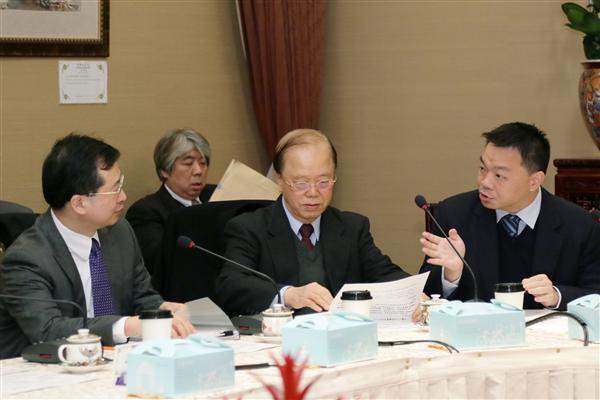News & activities
 News releases
News releases
President Ma Ying-jeou met on the morning of February 21 with advocates of judicial reform at a seminar and exchanged opinions on a wide range of topics, including the advisory jury system and the judicial evaluation system. The president stated that these steps will bring the legal system more closely in line with common sense, and increase public trust in the judiciary.
In remarks, President Ma said that this is the 18th time in the past two years that he has attended a seminar to exchange opinions with civic groups on public policy matters. He noted that two years ago when he met with representatives of the Action Alliance of Judges to Reform the Supreme Court, he responded substantively to the call by the Action Alliance to ensure complete transparency in the Supreme Court's case-assignment procedure. One month later, he noted, the Judicial Yuan formally abolished the Supreme Court's practice of maintaining secrecy in the assignment of cases to judges, a system which had been in place for over 60 years. This has significantly enhanced judicial transparency and the accountability of judges, the president remarked.
President Ma then discussed why the public does not get the feel that judicial reform is taking place, even though it is. In light of the public's longstanding lack of trust in the legal system, which had had an adverse impact on the sustainability and independence of the nation's judicial system, the president said that five years ago when he took office he began actively seeking to rebuild public trust in the judicial system. He stated that the principle of judicial independence cannot be compromised, and outside interference in the judiciary cannot be tolerated. There can be no grey area in this regard, he said.
President Ma pointed out that the government's judicial reform efforts over the past five years have been based on the principle that "the judiciary exists for the people's sake." For instance, the president mentioned, systems have been implemented to ensure that judges start court proceedings on schedule, and that they display a better attitude while conducting court proceedings. According to data released by the Judicial Yuan in August 2013, 75.8% of 1,438 individuals surveyed who had had dealings with the courts expressed satisfaction when asked if the court proceedings had begun on time, he said. He noted that while timeliness is just a very small request that the public has of the courts, it constitutes a major step forward in creating an efficient and high-quality judicial environment.
As for the evaluation system for the nation's justices, the president stated, the Judges Act, which had been stuck in the legislative process for over 20 years, was finally passed in July 2011. The law provides for the establishment of a Judicial Evaluation Committee, helping to create a mechanism to remove incompetent judges from their posts. President Ma explained that the Judicial Evaluation Committee is comprised of judges, prosecutors, attorneys, and scholars. This committee has now been in existence for two years, convened 31 meetings, and accepted 20 cases for review. Of these cases, 13 have been concluded. He commented that these statistics show that room still exists for further improvement in the judicial sector. However, he stated, he is confident that courts at all levels are demonstrating better self-discipline, and that judges are now better monitored. The president said that positive effects will certainly result. Furthermore, he expressed confidence that judges are also becoming more careful about the attitude they display when holding court proceedings.
As for the advisory jury system, President Ma stated, systems offering public participation in court proceedings vary throughout the world due to the unique social and legal backgrounds of each nation. The president stressed, however, that the Judicial Yuan at this point is just laying the foundation for an advisory jury system, and it is expected that what's been done so far will only be the first step toward creating a stable mechanism via which the public is able to participate in court trials.
President Ma further stated that the ROC's Judicial Yuan began in 1987 to formulate legal mechanisms to enable public participation in criminal trials. After many years of research, the individuals involved in this work unveiled an advisory jury system that offers a means for the public to observe and comment on trials without actually being involved in determining court judgments. This system, he added, enables the public to actually participate in the justice system, but at the same time allows judges to have the final say. President Ma noted that judges are required to respond and provide their reasoning when they do not agree with the comments of lay judges. The benefit of this system is that people become more involved in the judicial process and come to understand it better. At the same time, the system ensures that judges will be cognizant of public opinion when they hand down decisions. The result is likely to be judgments that are more acceptable to the public. The president said that last year the Judicial Yuan had a public opinion survey carried out, and the results indicated that 81% of respondents believed that the system, once it is implemented, will help to enhance trust in the judiciary.
President Ma emphasized that the advisory jury system is in no way a political football; rather, it is a major reform that enjoys support across party lines. The president urged the public to understand the government's urgency in promoting the trial observation system. He added that he hopes all political parties will coordinate and cooperate in this effort so that this major step in judicial reform can be achieved.
The president also stressed that the many little steps being taken in judicial reform are gradually coming together to create a significant impact. He said, however, that attention must be paid to the breadth of the reforms, and care must be taken to ensure balance, so as to avoid irreparable harm.



